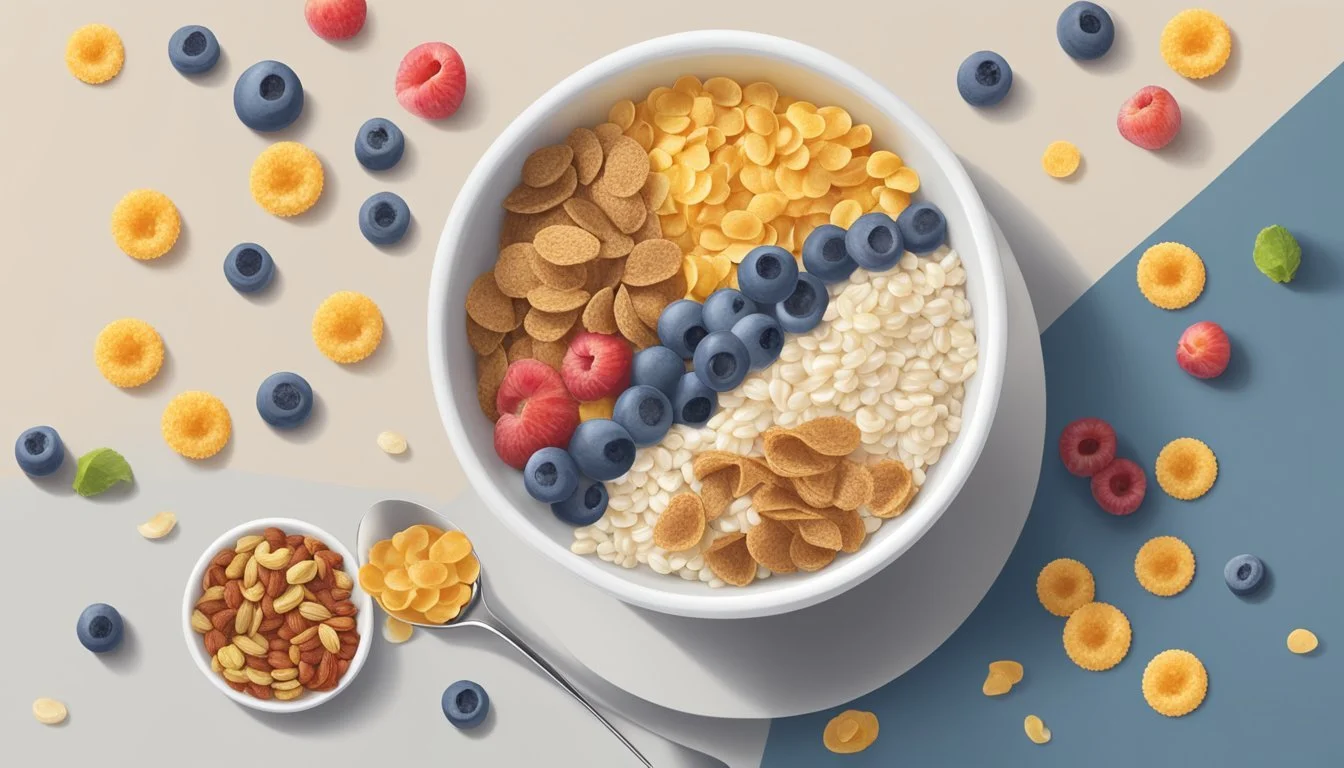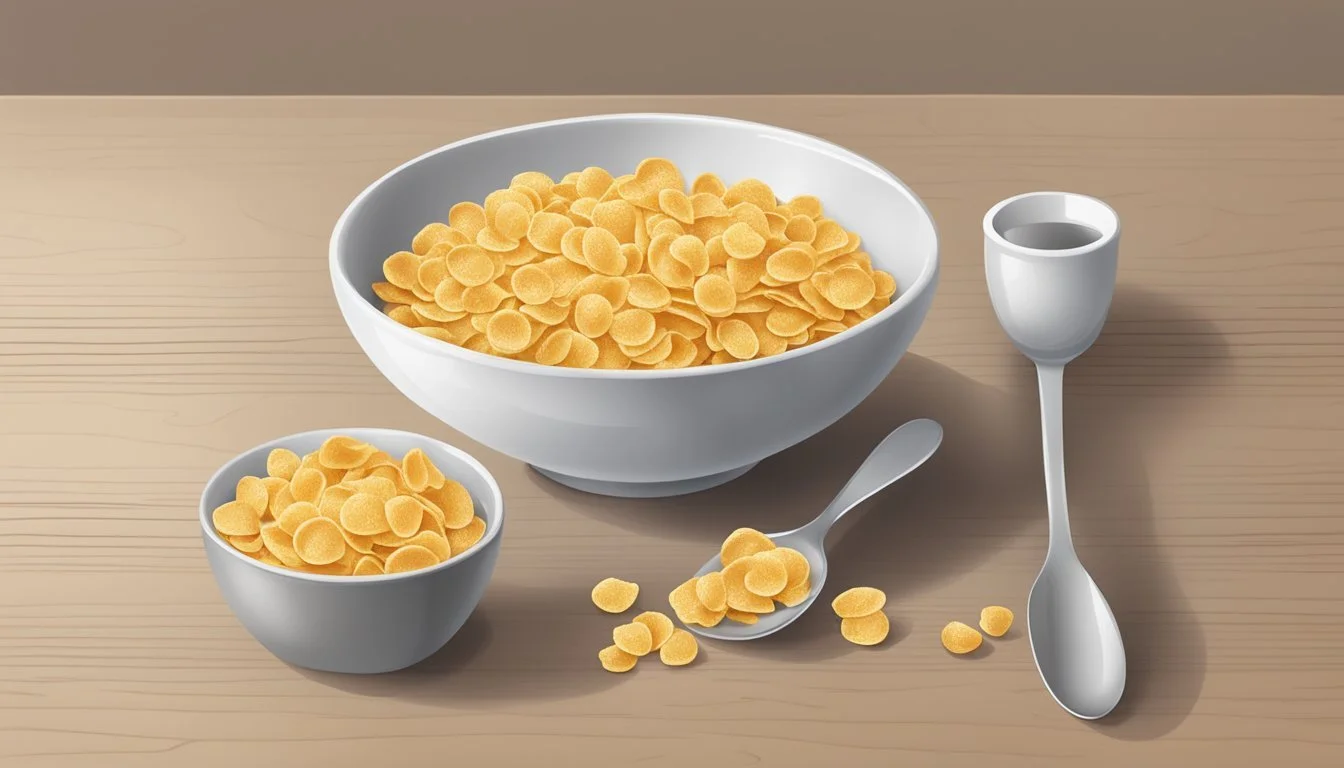Cornflakes Substitutes
Healthy and Tasty Alternatives to Your Breakfast Cereal
When it comes to finding the perfect substitute for cornflakes, there are a variety of options that cater to different tastes and nutritional needs. Oats and granola offer an excellent alternative, providing a delightful crunch and sweetness ideal for both sweet and savory dishes. Whether used as a topping or in baked goods, these options not only match the texture of cornflakes but also come with added health benefits.
For those looking to maintain a gluten-free diet, millet flakes serve as a nutritious choice. They are rich in essential nutrients like magnesium, phosphorus, and B-vitamins, making them a smart option. Millet flakes offer a crunchy and wholesome way to start your day, ensuring that you're getting more than just a simple cereal replacement in your breakfast bowl.
Rice krispies are another popular substitute, especially favored for their light and crispy texture. They can seamlessly replace cornflakes in a variety of recipes, ensuring that the taste and crunchiness remain consistent. This versatility makes rice krispies a go-to option for many who seek a reliable and tasty cornflakes alternative.
Understanding Corn Flakes
Corn flakes, a staple breakfast cereal, have been popular for decades due to their simplicity and nutrition. This section explores their origins, nutritional benefits, and versatile uses in cooking.
Origin and Popularity
Corn flakes were created in the late 19th century by Dr. John Harvey Kellogg as part of a healthy diet he advocated. Initially developed as a food for patients at Kellogg’s sanitarium, they quickly gained popularity beyond the hospital. The easy-to-prepare nature and mild flavor made them a household favorite.
Today, corn flakes are a ubiquitous part of breakfast tables worldwide. Their rise in popularity has been driven by aggressive marketing and the growing trend of quick, convenient breakfast options.
Nutritional Profile
A standard serving of corn flakes is low in calories but rich in carbohydrates, making them an energy-boosting start to the day. They typically contain:
Calories: around 100 per serving
Carbohydrates: roughly 24 grams
Vitamins: fortified with essential vitamins such as B1 (thiamine), B2 (riboflavin), and B3 (niacin)
Iron: added to support daily nutritional needs
While they are low in fat and protein, corn flakes are often enriched with vitamins and minerals to enhance their nutritional value. It's important to note that, without added sugars or flavorings, they remain a healthful choice.
Common Uses in Recipes
Corn flakes are most commonly consumed as a breakfast cereal. They can be enjoyed with milk, yogurt, or fruit for a balanced meal. Beyond breakfast, they serve as a versatile ingredient in various recipes.
In savory dishes, corn flakes are often used as a crunchy coating for fried or baked meats, such as chicken and fish. This is due to their ability to add texture without overpowering the dish's flavor.
In sweet recipes, they can be incorporated into treats like cereal bars or used as a topping for desserts like crumble and parfaits. Their mild sweetness and light texture make them an excellent addition to both sweet and savory culinary creations.
Benefits of Corn Flakes Substitutes
Corn flakes substitutes offer diverse health benefits and cater to specific dietary needs, making them an appealing choice for many.
Healthier Alternative Options
Substitutes for corn flakes, such as oats and granola, often come with a more nutritious profile. Rolled oats and toasted oats add essential vitamins and minerals to the diet. Unlike corn flakes, which can contain added sugars, these alternatives usually possess natural sweetness or no added sugars.
For those watching their sugar intake, opting for plain crackers or gluten-free options can be advantageous. These substitutes are versatile and can be used in both sweet and savory dishes, providing the flexibility needed for varied diets.
Increased Fiber and Protein Content
Corn flakes substitutes like rolled oats, granola, and oat groats are notably higher in fiber and protein. A diet rich in fiber aids digestion and helps maintain healthy cholesterol levels. For example, oats are renowned for their high fiber content, which promotes satiety and can assist with weight management.
Granola, especially when nuts and seeds are included, adds a significant protein boost. This combination of fiber and protein supports sustained energy levels and can aid in muscle repair and growth.
Managing Dietary Restrictions
For individuals with celiac disease or gluten sensitivities, finding alternatives to corn flakes is crucial. Gluten-free crackers and rice-based cereals like Rice Krispies provide safe options for those needing to avoid gluten.
Replacing corn flakes with these substitutes ensures that dietary restrictions are met without compromising on taste or texture. Such alternatives also cater to a broader range of dietary needs, including those managing cholesterol levels, by incorporating heart-healthy grains.
Types of Corn Flake Substitutes
Various alternatives can replace corn flakes, each bringing unique flavors and nutritional benefits. These substitutes include other cereals, grain-based options, and non-cereal alternatives, catering to different dietary needs and recipe requirements.
Cereals as Alternatives
Bran flakes and Rice Krispies are popular cereal substitutes. Bran flakes offer a nutritious option rich in fiber, making them ideal for those looking to boost their dietary fiber intake. Bran flakes maintain a similar texture to corn flakes and can be used in both sweet and savory dishes.
Rice Krispies, made from puffed rice, provide a light and crunchy texture. They can be used in breakfast bowls or as a topping for yogurt and desserts. The mild flavor of Rice Krispies makes them versatile for various culinary applications.
Wheat flakes are another suitable cereal substitute. Made from whole wheat, they retain more nutrients compared to processed cereals. They have a heartier texture and are perfect for adding crunch to recipes without compromising on nutritional value.
Grain-Based Substitutes
Oatmeal and granola stand out among grain-based substitutes. Oatmeal, made from whole grain oats, is known for its heart-healthy properties and high fiber content. It can be used in baking, as a breakfast cereal, or even to thicken soups and stews.
Granola, a mix of oats, nuts, and sweeteners, adds a crunchy texture and a touch of sweetness to dishes. It's a versatile ingredient that can enhance parfaits, baked goods, and snack bars. The combination of oats and nuts in granola provides a nutritious and energy-packed option.
Quinoa, a complete protein grain, is another excellent choice. Though not a cereal, cooked quinoa can be used in savory dishes or as a base for breakfast bowls. Its unique texture and nutrient profile make it a valuable addition to a healthy diet.
Non-Cereal Substitutes
Plain crackers and breadcrumbs can serve as non-cereal substitutes for corn flakes. Crushed plain crackers can mimic the crunchy texture of corn flakes in recipes, making them suitable for coatings on fried foods or as toppings for casseroles.
Breadcrumbs, especially panko, provide a similar crunch and can be used in various savory dishes. They are ideal for breading proteins or adding texture to baked dishes.
Toasted nuts and seeds, such as almonds or sunflower seeds, offer an additional non-cereal option. They add not only crunch but also a rich, nutty flavor to recipes. These substitutes are particularly valuable for those seeking gluten-free alternatives.
Incorporating Substitutes into Meals
Substitutes for cornflakes can enhance breakfasts, add unique textures and flavors to baked goods, and create nutritious snacks.
Breakfast Ideas
Toasted oats and granola make excellent additions to breakfast bowls. For a heart-healthy option, combine oats with milk or yogurt, and top with fresh fruit like berries or bananas. Another versatile choice is rice krispies, which pair well with honey and nuts, creating a crunchy, sweet breakfast. For those who prefer warmth, prepare oatmeal with toppings such as chopped nuts, dried fruits, or a dash of cinnamon.
Use in Baking and Cooking
Substitutes also shine in baking. Rolled oats can replace cornflakes in recipes such as casseroles or desserts, providing a nutty flavor and nutritional boost. For breadcrumbs, finely ground oats or crushed rice krispies can create a crispy topping for dishes like macaroni and cheese or chicken tenders. Additionally, crushed granola can be used to add texture and sweetness to muffins, cookies, and breads.
Creating Healthy Snacks
Healthy snacks can benefit from these substitutes. Rolled oats are perfect for making homemade granola bars. Mix oats with honey, nut butter, and dried fruit for a chewy, satisfying bar. Granola also works well as a topping for smoothies, adding crunch and sweetness. Additionally, rice krispies can be used to make light, crisp croutons for salads. Toasted and seasoned, they provide a delightful, crunchy texture.
Each of these substitutes offers unique benefits that cater to a variety of meals, making them versatile ingredients to keep on hand.
Choosing the Right Substitute
Selecting the ideal substitute for cornflakes depends on factors such as taste preferences, nutritional value, and desired texture. Different alternatives can cater to specific needs, whether you're seeking a nutty flavor, a hearty and filling option, or something more wholesome and nutritious.
Taste Preferences
When choosing a cornflakes substitute, the taste is crucial. Rolled oats offer a mild, slightly nutty flavor that complements sweet dishes. If a sweeter taste is preferred, granola mixes, often toasted and combined with honey or maple syrup, provide a satisfying sweetness and crunch. Rice krispies offer a neutral flavor that pairs well with various toppings and sweeteners. For those looking for something unique, quinoa clusters can bring a slightly earthy flavor with a touch of nuttiness.
Nutritional Consideration
Nutrition is a key factor in selecting a cornflakes substitute. Rolled oats are high in fiber, protein, and essential vitamins, making them a nutrient-dense choice. Whole wheat flakes provide an excellent source of whole grains and contribute to daily fiber intake. For higher protein content, quinoa clusters are an excellent option, offering all nine essential amino acids. Granola can vary in nutritional value depending on the ingredients; opting for versions with nuts, seeds, and dried fruits can boost its nutrient profile. Rice krispies, while often fortified, may have less fiber and protein compared to other options.
Texture and Consistency
Texture is another important consideration for a cornflakes substitute. Rolled oats have a soft, flaky texture when consumed as cereal but can be toasted for added crunch. Granola is typically crunchy, making it perfect for adding texture to yogurt or baked goods. Rice krispies provide a light and crispy consistency that holds up well in milk. If a crunchy and protein-rich alternative is desired, quinoa clusters offer a dense and crisp texture. Whole wheat flakes are similar to cornflakes in their satisfying crunch but provide a slightly denser bite.
By assessing these factors—taste, nutritional value, and texture—one can easily find the most suitable cornflakes substitute for their dietary and culinary needs.
Specialty Substitutes
Specialty substitutes offer alternatives catering to specific dietary needs, such as gluten-free options for those with celiac disease and low-fat and low-sugar options for health-conscious individuals.
Gluten-Free Alternatives
For those requiring gluten-free choices, rice krispies are an excellent substitute for cornflakes. Made from puffed rice, they deliver a light and crispy texture. Plain crackers, crumbled, can also substitute cornflakes, offering versatility for both sweet and savory recipes.
Gluten-free granola combines oats with nuts and dried fruits, creating a flavorful, crunchy cereal. Those avoiding gluten can also turn to quinoa flakes, which provide a similar texture while being rich in protein. Gluten-free oats, such as those certified by the Gluten-Free Certification Organization, ensure no cross-contamination, making them safe and nutritious.
Low-Fat and Low-Sugar Options
Many popular substitutes offer health benefits by being low in fat and sugar. Rolled oats are a top choice, containing minimal fat and no added sugars. These can be toasted for added crunch, making them useful for breakfast or baking toppings. Oatmeal, another excellent option, is recognizable for its heart-healthy properties and ability to maintain a low glycemic index, beneficial for blood sugar control.
Toasted bran provides a crunchy texture with low-fat content, ideal for those watching their caloric intake. Additionally, plain puffed rice can replace cornflakes, delivering the necessary crunch without excess fat or sugar. Puffed millet or barley are other viable options, each being naturally low in fat and sugar while providing essential nutrients.
Creative Uses and Recipes
Cornflakes have traditionally been a breakfast staple, but several creative substitutes can elevate various dishes' flavor, nutrition, and texture. Here’s how some of these alternatives can be leveraged in unique recipes and culinary endeavors.
Homemade Mixes
Creating homemade mixes with cornflake substitutes can provide customizable and healthier snack options.
Granola and Oats: Combining oats with nuts, seeds, and a touch of honey or maple syrup can produce delicious granola. Toasting the mix enhances its crunch, making it an excellent topping for yogurt or smoothie bowls.
Rice Krispies: Crushed rice krispies add a light and crispy texture. They're great for coating chicken or fish before baking for a healthier, crispy crust.
Crackers: Crushed plain or flavored crackers can replace bread crumbs in meatballs, meatloaf, or as a casserole topping. Choose gluten-free crackers if necessary for dietary restrictions.
Innovative Cooking Hacks
Incorporating these substitutes into innovative recipes can enhance both sweet and savory dishes.
Chia Seed Pudding: Soaking chia seeds in milk or a milk substitute overnight creates a gel-like consistency. This pudding can be enhanced with fruits, nuts, and a drizzle of honey for a nutritious breakfast or dessert.
Oatmeal Cookies: Using oatmeal instead of flour can make cookies healthier and chewier. Add cinnamon and raisins for extra flavor.
Breaded Toppings: Using oats or crackers for breading chicken or pork chops before baking can provide a satisfying crunch without frying. Mix with herbs and spices for flavor variations.
Exploring International Varieties
Different cultures have unique twists on what can replace cornflakes, allowing experimentation with international flavors.
Japanese Panko Breadcrumbs: These breadcrumbs are lighter and flakier than traditional breadcrumbs, making them ideal for coating fried foods. They create a crispier texture without excessive greasiness.
Indian Poha: Made from flattened rice, poha can be used similarly to cornflakes. It’s often lightly toasted with spices and nuts for a savory snack or breakfast option.
Mexican Tortilla Strips: Thinly sliced and baked or fried corn tortillas can replace cornflakes in savory dishes, adding a robust corn flavor and crunchy texture. Use them in casseroles, salads, or as a soup topping.
Choosing the right substitute can significantly enhance the dish's taste and texture, whether one is enhancing a traditional recipe or trying something new.







